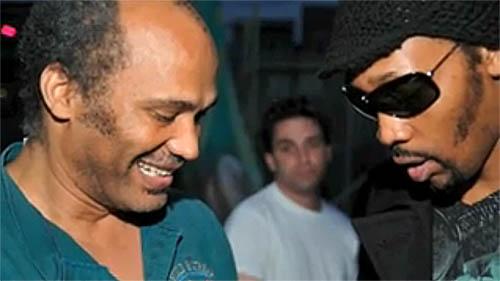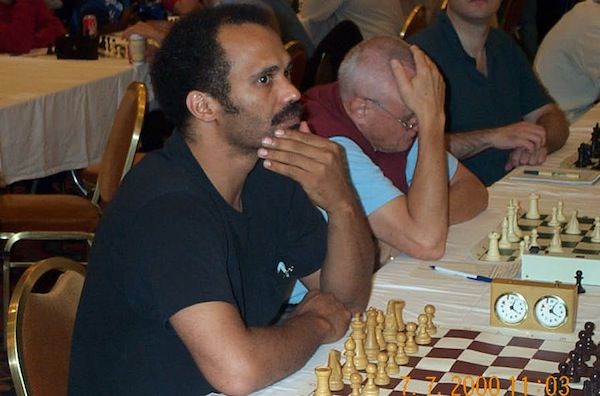
The Man That Walked By Himself
The recent departure of IM Emory Tate is a severe blow to American chess. While we have many chess players who are stronger than him and a huge number of chess players who are weaker than him, we'll never have another Emory Tate.
In this article I'll try to explain what made Emory unique.
When you read about IM Tate you cannot miss his two signature games: vs. GMs Yudasin and DeFirmian. These two games are everywhere (even in Wikipedia). We analyzed the above-mentioned gems when we talked about how to beat a much stronger opponent.
(Photo by Erik K. Arnold via The Chess Drum)
Closer to the end of his life, GM David Bronstein was getting upset when well-wishers were mentioning his world championship match vs. Botvinnik and praised his famous book "Zurich International Chess Tournament, 1953."
In one of his interviews Bronstein famously said: "I am not just 12:12 and Zurich '53"! I have a feeling that if Emory Tate read articles about himself in heaven's library, he probably would say something similar: "People, please, I am not just the games vs. Yudasin and DeFirmian."
I cannot say that I knew Emory very well, but since I met him hundreds of times during countless open tournaments and played him a dozen times, I think I can share my impression of this unique person.
I saw him for the first time about 20 years ago in one of the first open tournaments I played in the U.S. You couldn't possibly miss him in a tournament room. Even if it was the World Open with its thousands of players, you would still notice him. He always stood out from the crowd. He was like an alien in the ocean of people. Everything about him was different.
After the flak I got when called the current women's world champion "beautiful" in this article, I am almost afraid to call IM Tate handsome. But I hope that while it is an offense to call a woman beautiful in our warped society, it should be still OK to call a man handsome.
So, Emory was indeed a handsome man, but of course we have many heartthrobs amongst chess players. What was really different in Emory was his posture! The years of scrutinizing chess games take their toll on practically all chess players. When I saw Emory Tate first time, I almost thought that an athlete entered a chess convention by mistake. When I saw him last time, he still kept his military posture!

Emory Tate's attitude towards life was also very distinctive. While most chess players (and non-chess players as well!) are interested in ratings, prizes, and material possessions, these down-to-earth things were of little interest to Emory. All he needed was a rush of adrenaline and a crowd that was ready to listen to him. And boy, did he have his crowds!
Whenever you entered a lobby of the hotel where a tournament was taking place and saw a tight circle of people around a chessboard, you can bet there was Emory Tate in the middle of the circle. I was there when IM Tate won that famous game vs. Yudasin. For most chess players such a brilliant win would be a sign that the chess goddess smiled upon them and therefore it could become The Tournament of their lives.
Not for Tate! After beating Yudasin, Emory lost any interest in the tournament. Before, after and sometimes even during his remaining tournament games Tate spent time in the lobby or a skittles room demonstrating the game vs. Yudasin to everyone who was willing to see it. And you had to listen to his annotations!
Just like everything else, the way Tate spoke chess was unique. I remember my shock when instead of something usual like "queen to h5", I heard "witch to h5." Well, I just came to the country, and my English wasn't good at all, so I thought that it could've been some sort of slang for a queen. It took me a while to realize that it wasn't "witch" that Emory actually called the queen. 
But the major difference between IM Emory Tate and all other chess players was of course the way he played chess. Due to his crazy attacks, he was always very dangerous to a chess player of any level. Wikipedia claims that Tate won more than 80 games over grandmasters. I think the real number of his wins over GMs is much bigger since many of them didn't get into chess databases. That's the sad reality of U.S. open tournaments: the majority of the games there get lost forever.
Therefore, my dear readers, you are going to be first to see the next game, which as far as I know, doesn't appear in any database.
As I said already, I played with IM Tate many times, but of all of them, the most memorable game to me is the following loss. Right after the opening I got a completely winning position. While I already knew Emory as a very dangerous attacker, I was still thinking "come on man, not in this position!"
So both of us were doing what we did the best: he was attacking, I was getting into time trouble. At the very end, when I thought that he was about to resign, he surprised me with one of his signature combos. Can you find it?
More Emory Tate stories and games are coming next week!



